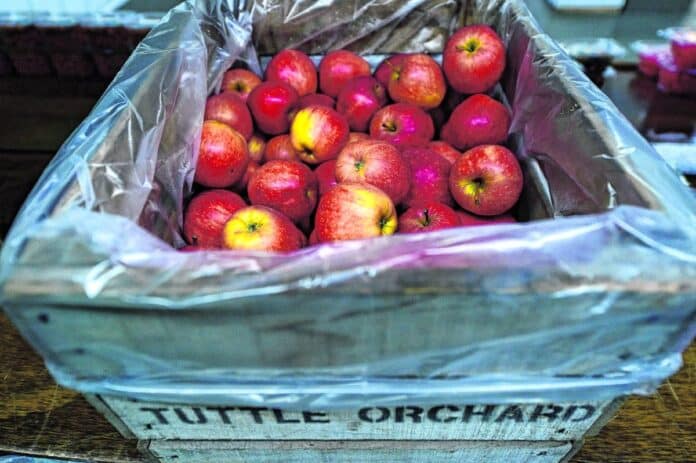HANCOCK COUNTY — What makes a great-tasting apple cider?
According to Thomas Roney, owner and production manager at Tuttle Orchards in Hancock County, it’s not just quality apples, but a variety of apples.
“If you mix it, it just tastes way better,” he said.
[sc:text-divider text-divider-title=”Story continues below gallery” ]
Tuttle Orchards mixed nine different kinds for the cider that recently came in second at a national contest. It added to a long line of accolades and an even longer history for the apple operation and agritainment venue northwest of Greenfield.
The second-place cider was one of 17 entrants in the 31st annual Illinois and National Sweet Cider Contest on Jan. 9 at the 2020 Illinois Specialty Crops, Agritourism and Organic Conference.
A news release from the contest states Tuttle Orchards used Cameo, Evercrisp, Gold Rush, Golden Delicious, Red Delicious, Enterprise, York, Breaburn and Fuji apples for its entry.
“Most people like it sweeter than tarter,” Roney said, “so you err on the sweet side. You kind of know what your base is, and you can add to that.”
How do you know which apples to mix?
Experience, Roney said, of which Tuttle Orchards has by the bushels.
His great-grandfather planted the orchards’ first apple tree in 1928. Today, the operation grows about 30 different kinds of apples on about 50 acres. Tuttle Orchards also grows about 20 to 30 acres of pumpkins, about 10 acres of sweet corn, about 30 acres of soybeans and some vegetables. It also offers agritainment in the fall.
The apple hasn’t fallen far from the tree ever since that first planting almost a century ago. Roney’s late uncle and namesake, Thomas Roney, got Tuttle Orchards’ cider operation up and running and showed his nephew the ropes several years ago.
No two batches of cider taste the same, Roney said.
“You have different apples at different times, so every batch tastes a little different,” he continued. “And each apple puts a different taste in the cider. Some you can taste at the end, some you can taste at the start. And some give it more thickness or more body to the cider, so it’s not real thin. It takes a certain blend.”
To make its cider, Tuttle Orchards feeds its apples through a press that crushes the fruit and separates the juice.
“There’s nothing added,” Roney said. “No water, no artificial flavoring, no sugar, nothing; it’s just cider.”
UV-light pasteurization and an absence of preservatives protect the cider’s taste, he continued, adding he estimates Tuttle Orchards will make about 30,000 gallons of cider this year.
October and November provide the best selection of apples for cider, Roney said. That’s when his staff will swell to about 150, up from about 10 who work during the less busy times of year.
Tuttle Orchards’ recent placement in the Illinois-based contest adds to the collection of framed certificates lining the walls of its market bearing statewide and national cider awards.
Ken Johnson, coordinator of the Illinois and National Sweet Cider Contest at the 2020 Illinois Specialty Crops, Agritourism and Organic Conference and an educator with the University of Illinois Extension, told the Daily Reporter that the 17 sweet cider entrants were primarily from around the Midwest.
Johnson said 10 judges conducted blind evaluations of the ciders, appraising elements like color, aroma, acidity, sweetness and thickness.
On the contest’s 25-point scale, Tuttle Orchards averaged 20.8, Johnson said.
Craig Tanner of Tanners Orchard in Speer, Illinois, won the sweet cider contest.
Tuttle Orchards’ cider and other products are available in the cafe and market on its property, located at 5717 N. County Road 300W, Greenfield.





